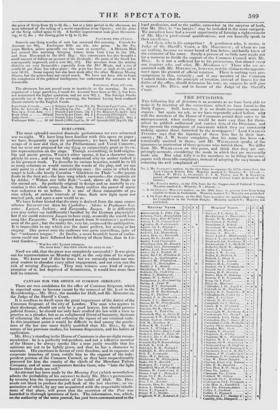CANVASS FOR THE OFFICE OF COMMON SERGEANT.
There are two candidates for the office of COMMON] Sergeant, which is expected soon to become vacant by the removal of Mr. LAW to the Recordership,—Mr. Him, the member for Hull, and Mr. MmEnousE, the Judge of the Sheriff's Court.
It is needless to dwell upon the great importance of the duties of the Common Sergeant of the city of London. The man who aspires to their discharge, should not only be a good lawyer, but should possess judicial fitness ; he should not only have studied the law with a view to practice as a pleader, but as an enlightened friend of humanity, desirous of reforming the abuses and softening the rigour of our criminal code. In this important point it would be difficult to find among the gentle- men of the bar one more highly qualified than Mr. HILL, by the nature of his previous studies, his humane disposition, and his habits of application.
Mr. HILL's standing in the House of Commons is also no slight recom- mendation: he is a perfectly independent, and not a talkative member of the House ; he always speaks like a man justly sensible that his opinions are not to be lightly given, and that he has a character to maintain. His exertions in favour of civic freedom, and in exposure of corporate breaches of trust, entitle him to the support of the inde- pendent portion of the Common Council, as they have unquestionably procured for him the enmity of the chiefs of the Merchant Tailors Company, and of some corporators besides them, who "hate the light because their deeds are evil."
An attempt has been made by the Morning Post (which nevertheless
admits the probability of his success) to decry Mr. pretensions, by terming him the representative of the rabble of Hull. Mr. HILL needs not blush to produce the poll-book of the last election ; an ex- amination of which, by any one acquainted with the respectable inhabi- tants of that place, will prove that the assertion of the Post was hazarded in thorough ignorance of facts. The information, too, which, on the authority of the same journal, has just been communicated to the legal profession, and to the public, somewhat to the surprise of both, that Mr. Hui. is "no lawyer," may be included in the same category. We ourselves have bud a recent opportunity of forming a right estimate of Mr. Hut's professional qualifications, and can honestly speak to their excellence.
And then, who is his competitor? A gentleman who, it seems, is Judge of the Sheriff's Court, a Mr. MinEnousE ; of whom we can say nothing, because we never heard of him before, and hardly knew of the existence of his court. Surely a person of so little note ought not for a moment to divide the support of the Common Council with Mr. HILL. Is it not a sufficient bar to his pretensions, that almost every one inquires who, and what, Mr. Mire/mouse is -2 Those who are ae.. quainter' with Mr. MIREHOUSE, however, rest his claims to the appoint- ment upon the ground of official rotation. There is nothing very pre- sumptuous in this, certainly ; and if any member of the Common Council thinks that the principle of rotation, instead of fitness for the duties of the office, should determine his vote, we suppose he will give it against Mr. HILL, and in favour of the Judge of the Sheriffs Court.
















 Previous page
Previous page